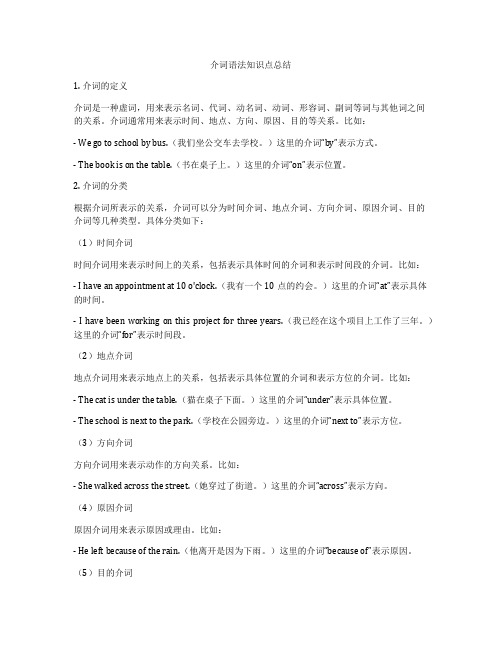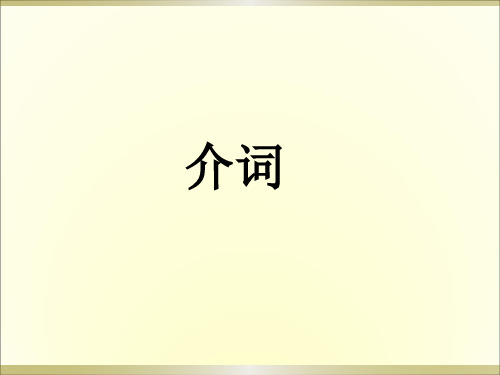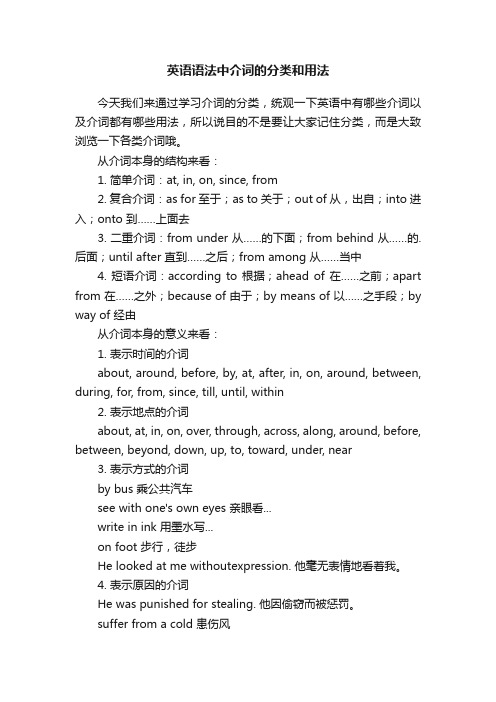介词的分类与语法功能
介词语法知识点总结

介词语法知识点总结1. 介词的定义介词是一种虚词,用来表示名词、代词、动名词、动词、形容词、副词等词与其他词之间的关系。
介词通常用来表示时间、地点、方向、原因、目的等关系。
比如:- We go to school by bus.(我们坐公交车去学校。
)这里的介词“by”表示方式。
- The book is on the table.(书在桌子上。
)这里的介词“on”表示位置。
2. 介词的分类根据介词所表示的关系,介词可以分为时间介词、地点介词、方向介词、原因介词、目的介词等几种类型。
具体分类如下:(1)时间介词时间介词用来表示时间上的关系,包括表示具体时间的介词和表示时间段的介词。
比如:- I have an appointment at 10 o'clock.(我有一个10点的约会。
)这里的介词“at”表示具体的时间。
- I have been working on this project for three years.(我已经在这个项目上工作了三年。
)这里的介词“for”表示时间段。
(2)地点介词地点介词用来表示地点上的关系,包括表示具体位置的介词和表示方位的介词。
比如:- The cat is under the table.(猫在桌子下面。
)这里的介词“under”表示具体位置。
- The school is next to the park.(学校在公园旁边。
)这里的介词“next to”表示方位。
(3)方向介词方向介词用来表示动作的方向关系。
比如:- She walked across the street.(她穿过了街道。
)这里的介词“across”表示方向。
(4)原因介词原因介词用来表示原因或理由。
比如:- He left because of the rain.(他离开是因为下雨。
)这里的介词“because of”表示原因。
(5)目的介词目的介词用来表示目的或目标。
语法归纳介词的分类与用法

语法归纳介词的分类与用法介词是英语语法中的一类虚词,用于连接名词、代词、动词或其他词组,起到指示、限定或补充的作用。
在日常交流中,正确使用介词可以使句子更加准确、通顺,并且更好地表达自己的意思。
本文将对常见的介词分类和用法进行归纳总结。
一、位置介词(Prepositions of Place)1. On(在……上面):- 表示某物处于平面上,例如:on the table(在桌子上)- 表示某物在某个交通工具上,例如:on the bus(在公交车上)2. In(在……里面):- 表示某物处于空间之中,例如:in the room(在房间里)- 表示某物位于某地,例如:in Beijing(在北京)3. At(在……处):- 表示某物在某个具体位置,例如:at the park(在公园里)- 表示某个时间点,例如:at 9 o'clock(在九点)4. Under(在……下面):- 表示某物处于其他物体下方,例如:under the bed(在床底下)- 表示某物位于某个地理位置下方,例如:under the bridge(在桥下)二、方向介词(Prepositions of Direction)1. To(到……):- 表示向某个地点移动,例如:go to the cinema(去电影院)- 表示给予某人或某物,例如:give the book to Tom(把书给了汤姆)2. From(从……来):- 表示从某个地点出发,例如:come from Beijing(从北京来) - 表示某物来源于某处,例如:a gift from my friend(来自我朋友的礼物)3. Into(进入……内):- 表示进入或穿过某个空间,例如:jump into the pool(跳进游泳池)- 表示某物转化为另一种状态,例如:transform into a butterfly (变成蝴蝶)4. Out of(离开……):- 表示离开某个地点,例如:get out of the car(从车里出来)- 表示摆脱某种状态或限制,例如:break out of prison(越狱)三、时间介词(Prepositions of Time)1. In(在……时):- 表示某个具体时间段,例如:in the morning(在早上)- 表示某个季节或年份,例如:in summer(在夏季)2. On(在……日):- 表示具体的某一天,例如:on Monday(在星期一)- 表示节日或特殊的日期,例如:on Christmas Day(在圣诞节)3. At(在……点):- 表示具体的某个时间点,例如:at 2 p.m.(在下午两点)- 表示某个时刻,例如:at midnight(在午夜)4. For(持续时间):- 表示持续的一段时间,例如:study for two hours(学习两个小时) - 表示某事发生的时间跨度,例如:for the whole week(整个星期)四、原因介词(Prepositions of Reason)1. Because of(因为):- 表示某个原因导致某个结果,例如:He couldn't come because of the bad weather(因为天气不好,他不能来)2. Due to(由于):- 表示某个原因导致某个结果,具有正式文体,例如:The train was delayed due to heavy rain(由于大雨,火车晚点了)3. Owing to(由于):- 与 due to 同义,用法上稍显书面,例如:The match was canceled owing to the lack of players(由于队员不足,比赛被取消)五、方式介词(Prepositions of Manner)1. By(通过、以……方式):- 表示某种方法或手段,例如:travel by plane(乘飞机旅行)- 表示某种交通方式,例如:go to work by bus(乘公交车上班)2. With(用……方式):- 表示伴随或使用某种物品,例如:write with a pen(用钢笔写)六、比较介词(Prepositions of Comparison)1. Like(像):- 表示类似、相似,例如:She looks like her mother(她长得像她妈妈)- 表示比较相近的程度,例如:It tastes like chicken(尝起来像鸡肉)2. Unlike(与……不同):- 较 like 相反,表示与某事物不同,例如:He is unlike his brother in personality(他的性格与他弟弟不同)以上是常见的介词分类和用法总结。
高考英语语法填空技巧分类突破:介词

短语介词: according to 、 out of 、 because of、 by means of、 in spite of 、 instead of
双重介词 : from behind /above / under , until after
分词介词 :considering , including , judging from /b
8. On 与 about 区别
简单区分:about通俗大众;on学术【专业】性强
on与about 二者都是介词,意为“关于,论及” 等,一般情况下,二者可以互相替换,但二者有 点区别:about常用于简单的或浅显的论述等,是 一般用语,多用于讲故事,谈话;思考等; on多 用于系统论述或专题讲演、论著等,具有学术性, 如:The teacher told us a story about Lei Feng. It's very moving. He will give us a talk on the history of the Party.他将给我们做个关于 党史的报告。
10 表原因的介词:
for , because of , due to , owing to , on account of , as a result of 1. He didn’t come to the meeting ______ his illness 2. The reason ______ his being angry is that he lost his cell phone. 3. ______ a heavy snow , the highway has been closed up. 4. The accident is ______ the driver’s drinking .
英语语法中介词的分类和用法

英语语法中介词的分类和用法今天我们来通过学习介词的分类,统观一下英语中有哪些介词以及介词都有哪些用法,所以说目的不是要让大家记住分类,而是大致浏览一下各类介词哦。
从介词本身的结构来看:1. 简单介词:at, in, on, since, from2. 复合介词:as for 至于;as to 关于;out of 从,出自;into 进入;onto 到……上面去3. 二重介词:from under 从……的下面;from behind 从……的.后面;until after 直到……之后;from among 从……当中4. 短语介词:according to 根据;ahead of 在……之前;apart from 在……之外;because of 由于;by means of 以……之手段;by way of 经由从介词本身的意义来看:1. 表示时间的介词about, around, before, by, at, after, in, on, around, between, during, for, from, since, till, until, within2. 表示地点的介词about, at, in, on, over, through, across, along, around, before, between, beyond, down, up, to, toward, under, near3. 表示方式的介词by bus 乘公共汽车see with one's own eyes 亲眼看...write in ink 用墨水写...on foot 步行,徒步He looked at me withoutexpression. 他毫无表情地看着我。
4. 表示原因的介词He was punished for stealing. 他因偷窃而被惩罚。
suffer from a cold 患伤风be ashamed of 因……而感到羞愧shake with cold 因寒冷而发抖5. 表示关于的介词What is the book about? 这本书是关于什么内容的?(about关于一般情况)I heard him talk on Chinese medicine last night. 昨晚我听到他讲中国医学。
介词的用法总结语文

介词的用法总结语文一、介词的定义和作用介词是语法中的一类虚词,常常用来表达两个词语之间的关系。
它可以连接名词、代词、动名词、动词不定式等成分,并且在句子中充当状语或补足语的作用。
二、介词的分类和特点1. 位置类型介词:表示地点或方向关系,如在、上、下。
2. 时间类型介词:表示时间关系,如在、经过、从。
3. 方式类型介词:表示方式和手段,如用、靠。
4. 陪衬类型介词:表示伴随关系,如和、与。
5. 条件让步类型介词:表示条件和让步关系,如如果、尽管。
6. 目的结果类型介词:表示目的和结果关系,如为了、以便。
三、常见介词及其使用方法1. "在"、“向”、“往”的区别:在:表示位置,在某个范围内或某个具体位置。
例如:“我在图书馆学习。
”向:表示移动行为,动态意义较强。
例如:“他向北走去。
”往:表示行进方向,并无具体动作。
例如:“她往西走了。
”2. “对于”、“对”、“于”的区别:对于:表达对某人或某事的看法、态度或观点。
例如:“对于他的行为,我们表示谴责。
”对:表示方向、目标等。
例如:“我很喜欢对你微笑。
”于:用在名词前面,起到修饰或说明作用。
例如:“他是于先生。
”3. “因为”和“由于”的区别:因为:表示因果关系,引出原因。
例如:“她迟到了,因为路上出了交通事故。
”由于:表示某种情况导致结果。
例如:“由于天气恶劣,比赛被取消。
”4. “跟”和“与”的区别:跟:表示陪伴、随着的意思。
例如:“我跟朋友一起去旅游。
”与:表示并列或相比较的关系。
例如:“成功与失败都是自己去争取的结果。
”5. “根据”和“依据”的区别:根据:指以某个事物作为判断、决策等的依据和根本。
例如:“我们制定计划要根据实际情况来进行。
”依据:指以某种法规、规定等作为依托和参照。
例如:“我们进行工作要依据公司的规章制度。
”四、常用短语及搭配1. 按照:按照某种标准、方法或要求进行。
例如:“我们要按照客户的需求来生产产品。
高中英语语法介词知识点大汇总,一篇让你全搞懂!

高中语法的难度加大,在考试中的比例也大大增加了,完型、阅读、写作都需要语法的熟练运用。
今天为大家整理了语法中介词的知识点,赶紧学起来哦!介词的英语全称为“preposition”是由“前缀pre-(在……前部)+position(位置)”构成的,所以又叫前置词。
一般放在名词、代词或动名词的前面。
介词是虚词,主要用来表示人、物、事件等与其他人、物、事件之间的关系,如空间位置、时间先后、因果关系、方式方法等。
介词与其宾语构成介词短语。
可作介词宾语的主要有名词、代词、动名词(或动名词短语)、名词性从句等。
一.介词的分类分类特点例词简单介词即一个介词about,across,after,against,among, around,at,below,beyond,during, in,on等等。
合成介词由两个介词构成的合成词into,onto,throughout,upon,within短语介词由短语构成according to,because of,instead of, up to,due to,owing to,thanks t o等等。
双重介词由两个介词搭配而成from among,from behind,from under,till after,in between等等。
分词介词由现在分词转化而来considering(就……而论),including,regarding,concerning等。
兼类介词由形容词直接转化而来like,unlike,near,next,opposite等等。
二.介词短语的语法功能介词不能独立在句中做成份,介词后必须与名词、代词、或动名词构成介词短语在句中充当一个成分,表示人、物、事件等与其它人、物、事件等之间的关系。
介词短语的功能例句作定语They didn’t find the solution to the problem.作状语We have breakfast at seven.(表时间)They were late for the meeting because of the heavy rai n.(表原因)What do you mean by doing such a thing?(表方法)Nothing in the world could live without air or water.(表条件)作表语When I paid a visit to you yesterday,you were not at h ome.作宾语补足语I found the old building in a bad condition.三.表示相同或相似概念的介词(短语)的区别表示的概念介词(短语)区别例子时间inonatat在一个时间点上;in在一段时间之内;on在具体某一天或具体的上午、下午、晚上。
介词知识点的归纳总结

介词知识点的归纳总结一、介词的定义介词是一种虚词,用来连接名词、代词、动名词或者其他成分,构成介词短语,表示时间、地点、方向、方式等关系。
二、介词的分类1. 根据功能(1)时间介词:on, at, in, before, after, during等(2)地点介词:in, on, at, under, above, below等(3)方向介词:to, from, into, out of, along, toward等(4)方式介词:by, with, through, for, like等2. 根据用法(1)简单介词:单个词组成的介词,如in, on, at等(2)复合介词:由两个或两个以上的词组成的介词,如because of, in spite of, on behalfof等3. 根据构词(1)合成介词:由两个或两个以上词组成的介词,如into, toward等(2)派生介词:通过增加后缀或叠加形成的介词,如underneath, throughout等三、介词短语的作用介词短语通常用来修饰名词或者代词,起着修饰、定位、时间、地点、方式等作用。
介词短语在句子中担任着重要的语法成分,需要注意其搭配和使用。
1. 修饰名词或代词介词短语可以修饰名词或代词,起着定语的作用。
如:the book on the table(桌子上的书)2. 表示时间介词短语可以表示时间的起止、时点、持续等概念。
如:at six o'clock(在六点)3. 表示地点介词短语可以表示地点的位置、方向、边界等概念。
如:in the box(在盒子里)4. 表示方式介词短语可以表示动作的方式、手段、原因等。
如:by train(乘火车)四、介词的用法注意事项1. 介词的搭配介词的搭配非常重要,不同的介词搭配可以表达不同的意义。
比如:at school, in the school, on the school都表示不同的含义。
prep.

Preposition
介词 ( preposition )
一 介词的分类与语法功能 1.介词是虚词, 不能单独做句子成分, 必须与名词、 代词( 或相当于名词的其他词类、短语、或从句 ) 构成介词短语,在句子中充当一个成分。 介词分为: 简单介词: at 、 in 、 on 、for 、 to 合成介词: within 、 inside 、 onto、 throughout . 短语介词: according to 、 out of 、 because of、 by means of、 in spite of 、 instead of
by Eggs are sold ______ the dozen.
九、in the end, at the end of, by the end of: in the end作“最后”、“终于”解,可单独使用, 后不接介词of; at the end of 表示“在……末梢”,“到……尽 头”,既可指时间,也可以指地上或物体。不 可单独使用; by the end of 作“在……结束时”,“到……末 为止”解,只能指时间。不可单独使用。 如:In the end they reached a place of safety. At the end of the road stands a beautiful garden. They decided to have an English evening at the end of this week. By the end of last month he had finished the novel.
between He divided the sweets ____________ L Nl, L Cl and Y Mh.
- 1、下载文档前请自行甄别文档内容的完整性,平台不提供额外的编辑、内容补充、找答案等附加服务。
- 2、"仅部分预览"的文档,不可在线预览部分如存在完整性等问题,可反馈申请退款(可完整预览的文档不适用该条件!)。
- 3、如文档侵犯您的权益,请联系客服反馈,我们会尽快为您处理(人工客服工作时间:9:00-18:30)。
、介词的分类与语法功能(1)介词是虚词,不能单独作句子成分,必须与名词、代词(或相当于名词的其他词类、短语或从句等)构成介词短语,在句中充当一个成分。
介词分为:简单介词,如at、in、for 等;合成介词,如within、inside、onto、througout等;短语介词,如according to、out of、because of、by means of、in spite of、instead of等。
双重介词,如from behind / above / under、until after等。
分词介词,如considering、including、judging(from / by) 等。
常见的介词宾语:名词、代词、动名词、从句、不定式等。
如:①It is going to rain this afternoon according to the weather forecast.②He quarrelled with her yesterday. ③He succeeded in passing the final exam. ④I’m still thinking of how I c an fulfil the task ahead of time. ⑤The professor will give us a talk on how to study English well.(2)介词短语在句中可作表语、定语、状语和宾补等。
如:①This machine is in good condition.(表语) ②Where is the key to my bike?(定语) ③Nothing in the world could live without air or water.(状语④She always thinks herself above others.(宾补)2、介词搭配(1)“动词+介词”搭配:注意特定搭配与同一介词与多个动词搭配意义不同的情况。
①rob sb. of sth. / clear the road of snow(“夺去、除去”意义的动词与of 连用)②supply us with food / fill the glass with wine(“供给”意义的动词与with连用)③make a desk of wood / make bread from flour / make the material into a coat(“制作、制造”意义与of、from、into连用)④介词+ the + 部位与动词的关系(=动词+ sb.’s + 部位,可换用)strike him on the head(“击,拍,碰,摸”意义与on连用) catch him by the arm(“抓,拉,拿,扯”意义与by连用) hit the boy in the face(“肚,胸,眼,脸”等人体前部与in连用)⑤prevent(stop, keep)sb. from doing sth.(“阻止,禁止”意义与from连用) 注:keep后的from 不能省,其它两个能省⑥persuade(advise, warn)sb. into doing sth.(“说服,建议”意义与into连用)⑦buy sb. for sth.(leave、get、win、gain、lose等“得失”意义与for连用)⑧tell sth.to sb.(show、teach、sing、write、read等“告知”意义与to连用)⑨give sth. to sb.(give、allow、promise、pass、hand等“授予”意义与to连用)注意:⑦⑧⑨可换成buy sb.sth.双宾结构。
⑩say to sb.(suggest、explain、apologize、murmur、whisper与“对象”连用必须用to)不可说suggest sb.sth.。
同一动词与不同介词搭配意义不同。
look for(寻找)hear of(听说) call on(拜访) look to (眺望) agree with sb(同意)call for(需要) 同一介词与不同动词搭配,意义各异。
reply to the letter回信,sing(dance)to the musi c和……唱(跳),amount to 达到,加起来有……,devote to把……贡献给,drink to为……干杯,object to反对,look forward to 渴望,come to 苏醒,belong to属于,search for搜……,ask … for … 寻找,use … for用作,leave for前往,take … for误以为,call for倡导,wait for等待,care for喜欢,make up for弥补损失,turn to 求助(救)于,help oneself to随意,agree to同意,compare … to把……比作,send for派人去请(拿)……,sail for驶向,航向,set out for动身去,go in for爱好……。
(2)常见“形容词+ 介词”搭配。
worry about / at sth. 替……而担心be afraid of 害怕different from与……不同amxious about sth. / sb担心…… different to … 不关心……be strict with sb,be strict in sth be tired of ... 是指“对……感到厌倦”,而be tired from... 是指“因……而疲倦”。
good for对……有益popular in some place流行在……worthy of值得的,glad about sth. for sb.为某人某事高兴,far from离……远,grateful for sth. to sb.为某事感激某人,free from没有……(免除……),proud of(take pride in)自豪,satisfied with (by)满意,sure of / about确信,fond of喜欢,fit for适合,busy with sth.(in doing sth.)忙着干某事,full of充满,ready for准备,similar to相似,wrong with不对;有毛病…… (3)“名词+ 介词”要注意习惯搭配和意义区分。
the absence of water缺水the hope of success成功的希望have a chance of (for) entering college上大学的机会take pride in them为他们感到骄傲the key to the question问题的答案a medicine for cough治咳嗽的药the ticket for tomorrow明天的票in Beijing去了北京his abesencefrom Beijing不在北京to study学习方法the way of studying maths学习教学的方法3、核心介词用法归纳与辨析(1)表示时间的介词in的用法如下。
表示在某一较长时间内,如世纪、年、月、季、周等一般用介词in,如:in the 1990s, in the year, in January, in(the) winter / summer / fall / spring, in the first week of May。
还可以用时段名词组成固定短语或词组。
如:in a while, in no time, in the daytime, in a short while, in time, in the morning (afternoon, evening)。
但要注意:①at night / at noon, in the day(在白天),in the night(大夜间)。
②in five days(weeks, months, years)中in意思是“在……以后”。
③in和during表一段时间内两词可互用。
如:in the night, during the night, in the war, during the war。
但略有区别:当接表示“活动”的抽象名词时多用during,接“活动”的动名词及短语时用in。
如:during the discussion in discussing the problemduring her stay in Hubei in playing basketballduring the course of in digging the tunnel(2)在具体的某一天或某天上午、晚上、前夕,常用on。
on Sunday(s).on Tuesday morningon Christmas Day(但at Chrismas),on Christmas Eve, onChildren’s Dayon March 8, on the morning (afternoon, evening)of Oct.1early on the morning of Oct.1(区别:in the late / early morning of Oct.1)on a rainy night, on warm winter days(3)表示某一时刻或某一点时间用at,如小时、分钟等。
at breakfast(supper, lunch),at sixat noon (sunrise, sunset, midday, night, midnight, dawn)at the age of 15, at the time of war,但in time of danger/ trouble。
注意:有些时间名词前不接介词。
如:next day、last Sunday、that morning、these yearsone、each、any、every、some、all修饰时,一般不用介词,如some dayone day、yesterday / afternoon,the night before(4)till、until、to的用法。
①till(until)与持续动词连用一般用于肯定句中,与短暂动词连用一般用在否定句中。
如:He waited for me till twelve o’clock.He didn’t get up till(until) 10 a.m.(不可用to).但注意:在句首出现或强调句型中一般不用till而用until。
